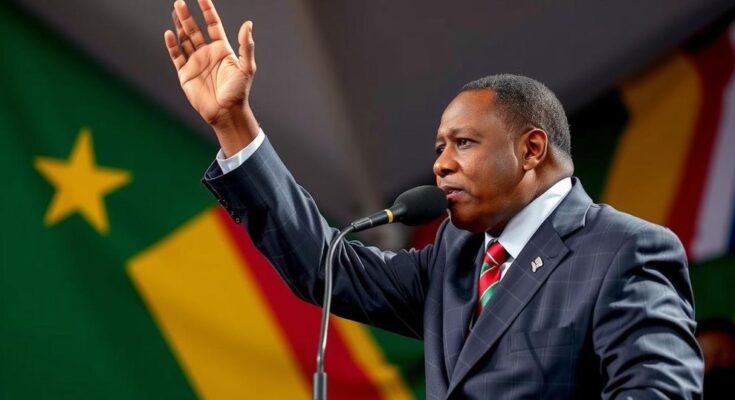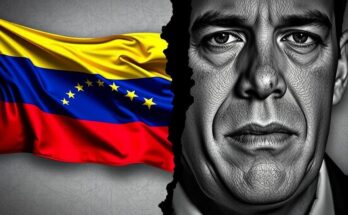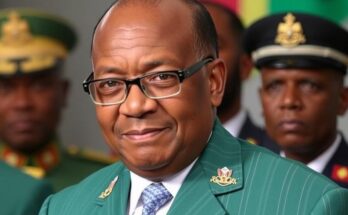Frelimo’s candidate, Daniel Chapo, emerged victorious in Mozambique’s presidential election with 70.7% of the vote, while opposition leader Venâncio Mondlane received 20.3%. The elections were marred by allegations of fraud, the killings of two opposition members, and statements from monitoring groups regarding ballot tampering. Mondlane has called for peaceful protests, emphasizing the demand for democratic change amidst a backdrop of violence and civil unrest.
The ruling party in Mozambique, Frelimo, has declared victory in the recent presidential election, obtaining 70.7% of the votes, as reported by the electoral commission. This outcome secures their candidate, Daniel Chapo, a clear first-round victory, thus bypassing the need for a runoff. In contrast, Venâncio Mondlane, an independent candidate who previously ran under the Podemos party and managed to resonate with younger voters, garnered 20.3% of the votes. This electoral process, however, was overshadowed by the tragic murders of two opposition leaders just days prior to the election. Elvino Dias, an opposition attorney preparing to contest the election’s results legally, and Paulo Guambe, a Podemos official, were killed by unidentified assailants. Civil society organizations had raised serious concerns about the integrity of the electoral process, alleging that Frelimo registered approximately 900,000 fictitious voters amidst a total electorate of 17 million. Following the vote, both local and international observers reported significant irregularities, including claims of ballot tampering. Furthermore, the Catholic bishops of Mozambique expressed their discontent over alleged ballot stuffing, while European Union observers noted inconsistencies during the vote counting phase. Mozambique, one of the poorest nations globally, remains in the throes of recovery after a financial scandal in 2016, which involved $2 billion in undisclosed corrupt loans, leading to a withdrawal of international financial support and subsequent economic decline. Mondlane, a former radio DJ, attempted to inspire youth involvement in the electoral process, appealing directly to the demographic that constitutes an average age under 18 years. Following the election results, he urged for peaceful protests, stating, “The time has come for the people to take power and say that we now want to change the history of this country. There won’t be enough bullets for everyone, there won’t be teargas for everyone, there won’t be enough armored vehicles.” In light of the tense political atmosphere, Zenaida Machado, a researcher with Human Rights Watch, emphasized the imperative for authorities to safeguard peaceful demonstrations and to thoroughly investigate instances of violence and unjust arrests related to election protests. She expressed concern regarding the conduct of security forces that might affect the treatment of protestors.
The political landscape in Mozambique has been dominated by the ruling party, Frelimo, since the country gained independence from Portugal in 1975. The recent presidential election results have sparked accusations of electoral fraud and violence against opposition candidates. The atmosphere surrounding the election was further fueled by the alleged murders of political activists, which has drawn the attention of human rights organizations and raised questions about the future of democracy in the nation. Furthermore, Mozambique’s economic challenges, stemming from past government scandals, complicate the electoral turmoil, as citizens seek stable leadership amidst lingering poverty and mismanagement.
In summary, the recent presidential election in Mozambique illustrates a troubling instance of alleged electoral malpractice, highlighted by the violent deaths of opposition figures and claims of voting irregularities. While the ruling party celebrates its victory, significant concerns persist regarding the integrity of the electoral process and the safety of dissenting voices. The call for peaceful protests by opposition leader Mondlane underscores the urgent need for a reformative shift in Mozambique’s political climate, suggesting that. citizens are eager for change amidst a long-standing historical context of Frelimo’s dominance.
Original Source: www.theguardian.com




